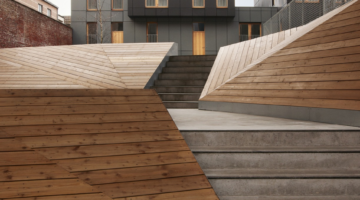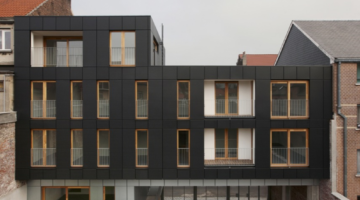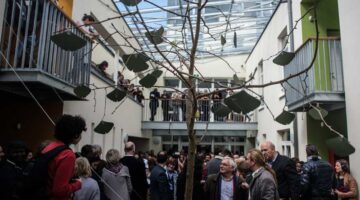123 rue Royale, Brussels
Main objectives of the project
Authorities often view squatters as a significant issue in the housing crisis. Many people become squatters out of necessity, but in doing so, they occupy units that could otherwise house other families in need. The case of 123 Rue Royale serves as a notable example of addressing this problem. Through a well-organized movement behind the occupation, residents were able to negotiate terms and reach a temporary agreement. This allowed them to stay in the building temporarily and transform it into a democratic hub of culture and activities. Eventually, this "legal" occupation came to an end, and the building was returned to its public owner. By following this model, the squatters prevented the sale of public land, and none of the residents were evicted.
Date
- 2007: Implementation
Stakeholders
- Wallonia Region
- Promotor: Woningen 123 Logements
Location
Country/Region: Belgium, Brussels
Description
Social housing constitutes about 8% of the total housing in Brussels. With 43.4% of the population being homeowners, more than half of the population relies on the private rental market. Less than half of social housing applicants are successful, and for the 41,000 families on the waiting list, the wait can exceed 10 years.
The first illegal occupation of empty buildings arose because public authorities had tools to make vacant buildings available to homeless people or to renovate and rent them out on a social basis. However, these tools were not being utilized. What began as an act of civil disobedience to highlight housing exclusion issues has evolved into a recognized movement affirming the social interest in occupying vacant spaces for housing. This is exemplified by the case of Woningen123Logements, or 123 Rue Royale, in Brussels.
In May 2007, a group of people took over the building at 123 Rue Royale. A temporary occupation agreement was quickly concluded with the Walloon Region, the owner of the premises. Among the new occupants were students, street dwellers, artists, undocumented people, and others seeking an alternative to traditional housing. They shared common experiences of difficulty in finding accommodation due to the housing crisis or personal reasons and a desire to live in collective and supportive housing. The non-profit organization is currently seeking a new location as the convention is ending. Additionally, 123 Logements aims to find alternative and concrete solutions to the housing crisis, particularly through the reallocation of empty buildings into self-managed housing.
The case became a pilot project with the signing of a temporary occupancy agreement between 123 Rue Royale and the Walloon Region as the landlord. The agreement allowed the occupants secure tenure for up to six months after the owner obtained planning permission to repurpose the building sustainably.
During the temporary agreement, 123 Rue Royale became an association with the objective of creating supportive and self-managed housing. The association does not intend to impede owners' investments but seeks a simple solution to legally occupy buildings awaiting allocation or investment, offering reliable guarantees for both owners and residents. The association is composed of 90% residents, 5% former residents, and 5% outsiders, with all decisions made in residents' meetings. In 2018, the agreement ended, and the occupants left the building. During the legal occupation, the building became a hub of cultural and economic activities in the neighborhood.
While temporary occupancy agreements are not seen as the ultimate solution to the housing crisis, they provide a roof, security, and comfort at a very low cost, serving as a temporary solution that allows households to save money for debts or sustainable rehousing. This case is notable because it involved community action, emphasizing the importance of seeing opportunities in the housing crisis rather than merely focusing on squatting as a problem.







